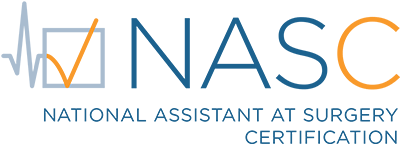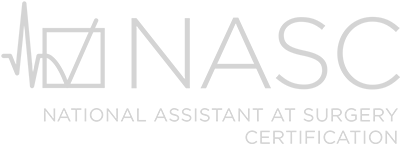CRNFA Job Analysis Task Force Meeting
Nine members of the RNFA community met in Denver in September 2019 to serve as Subject Matter Experts on the NASC Job Analysis Committee. They were chosen for their experience and diverse backgrounds, and enjoyed getting to know each other while discussing their day-to-day responsibilities.The group worked hard for two full days, but also enjoyed breaks in the Colorado sunshine and evening dinners out together. NASC is very grateful to each member of the committee for their hard work and dedication to their profession.
The committee members who participated in the meeting in Denver were (left to right in the above photo): Dawn Whiteside, Michael Sanudo, Sharon Van Wicklin, Andrew Peckham, Amanda Stauble, Charles Ludwig, Karen Knapp, Dawn Tammen, and Sheila Stein. In addition, Barbara Budinsky participated in preliminary planning prior to the meeting.
A job analysis must be conducted periodically as part of the accreditation process for the CRNFA certification. CRNFA accreditation is due to be renewed in 2020, and conducting a formal job analysis is an important first step in renewing accreditation for the credential. A job analysis can be summarized as “a description of what people do and know when completing a job or task.”
The final job analysis report identified seven domains of knowledge of the RNFA:
- Preoperative Patient Assessment
- Intraoperative Patient Care Interventions
- Emergency Situations
- Postoperative Patient Care Interventions
- Infection Prevention
- Perioperative Workplace Safety
- Professional Practice
 For each domain, the group prepared a comprehensive list of the important knowledge and task statements that qualify a professional to earn the CRNFA certification.
For each domain, the group prepared a comprehensive list of the important knowledge and task statements that qualify a professional to earn the CRNFA certification.
NASC contracted with Dr. Manny Straehle with Assessment, Education & Research Experts (AERE) to provide the psychometric services to prepare the final job analysis report. This report will serve as a blueprint for developing program needs such as exam questions, performance-based assessments, professional development activities, and candidate eligibility criteria for the CRNFA certification.
We are excited to have completed this first step in ensuring that CRNFA remains a respected, accredited certification that attests to the knowledge, skills, and professional development of the Registered Nurse Assistant in Surgery.
5 Comments
-
cecile spiegel says:
I just wish we could be billable when we assist on a Medicare cases or a Medicare replacement case. It is really hurting our profession not to. Physician’s assistant and nurse practitioners do get reimbursed. I feel when the certification is the same as surgical tech first assists, it decreases our professional abilities. In Florida surgical tech first assists do not need a college degree.
-
BJ says:
I agree with Cecile Spiegel’s comment concerning the CRNFA certification and the surgical technician first assist certification. It seems the two are becoming somewhat combined into a melting pot of certifications. I also agree (however I am not a subject matter expert) she is correct in stating scrub techs who become first assists are not usually required (varying state regulations?) to hold even an associate’s degree.
There is also at least one first assist program available that does not require prior operating room experience. For example, Eastern Virginia Medical School located in Norfolk, Virginia offers a Master’s prepared program in first assisting that requires applicants to have a BSN (can be any field of study) however the program does not require applicants to have a background in surgery or even the medical field. Those applicants graduate with a Master of Surgical Assisting degree but have never worked in an operating room (except of course for their training program). While these graduates are not “certified”, they are at a master’s prepared level.
Think back to the path we traveled to obtain first our RN, BSN, CNOR, and then our RNFA title. And then after that our CRNFA.
Are all the same?-
Karen Knapp says:
Yor pathway is correct. With SAs and CFAs. they must be supervised by the surgeon in the room. RNFAs practice in an expanded RN role and are independent under their own license. If that is not happening in your institution, they are assisting under the RN’s license the minute the surgeon leaves. It is our (RN) responsibility to make sure that does not happen.
-
-
Bernice Storm says:
I agree with the above replies that a surgical tech first assist does the same as an CRNFA. Apparently they only have to do 78 hours of continuing education as oppose to our 400 or more and they do not have to have a BSN or higher college degree. I do not think this is fair and think that there should be some distinction between the two. I think for all the effort we put into our job that Medicare and Medicaid should reimburse for our services; perhaps this could be the difference between CSTs first assists and CRNFAs.
Leave a Reply Cancel reply
info@nascertification.org | 866-681-NASC (6272) | Contact
© Copyright 2020 NASC




I am excited to see this group working so hard to maintain the integrity for our Certification. I consider it a privilege to be CRNFA and it is a job that can be difficult at times. Thank you for you hard work.